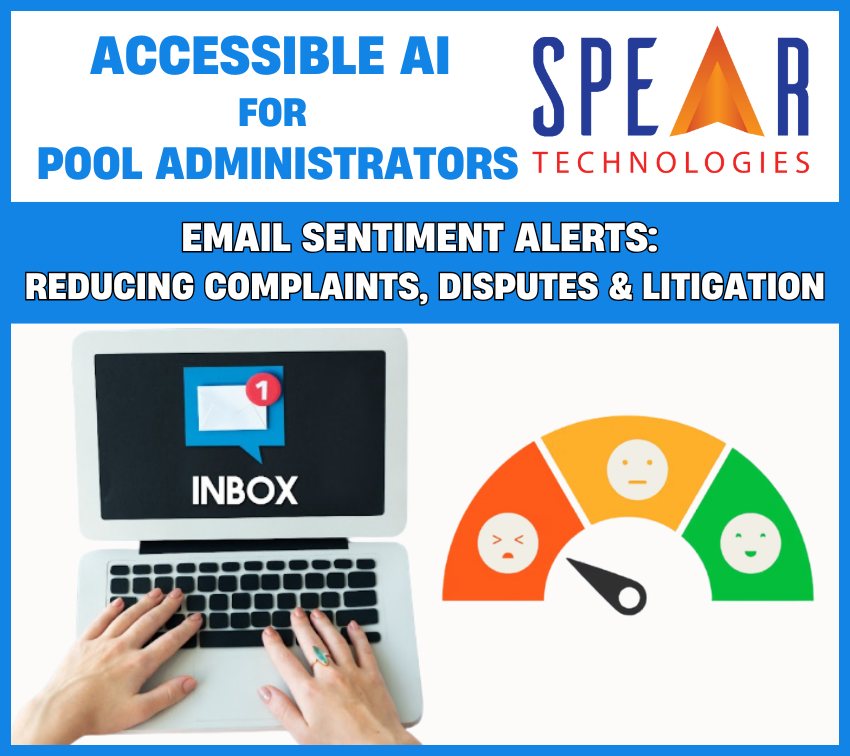Accessible AI for Pool Administrators: Email Sentiment Alerts: Reducing Complaints, Disputes, and Litigation

For Pool Administrators, communication quality can make or break member satisfaction and trust. While reports and metrics reveal outcomes, they often arrive too late—after frustrations have escalated into formal complaints or disputes.
Hidden in the daily stream of emails between members, TPAs, and vendors are early warning signs of dissatisfaction: shifts in tone, delayed responses, or repeated requests for clarification. These are often missed until they surface as grievances or even litigation.
Accessible AI changes that.
With AI-powered Email Sentiment Alerts, Pool Administrators can now identify early indicators of dissatisfaction and step in before problems escalate. By continuously analyzing the tone and sentiment in communication streams, this capability surfaces risk signals that would otherwise remain buried in inboxes—helping pools preserve trust, improve transparency, and prevent disputes before they arise.
How Email Sentiment Alerts Prevent Escalations
Traditional oversight systems track service metrics—response times, closure rates, or litigation outcomes—but they rarely capture the human signals of dissatisfaction that precede those outcomes.
Email Sentiment Alerts bridge that gap.
Accessible AI models analyze natural language in emails, identifying when tone shifts from neutral to negative or when specific patterns of frustration emerge. These alerts notify Pool Administrators in real time, allowing proactive outreach to clarify expectations, resolve miscommunications, or support the TPA in diffusing tensions.
Pool Administrators can:
- Monitor member and vendor communications for signs of frustration or confusion.
- Receive real-time alerts when tone suggests a relationship at risk.
- Intervene early to align communication and prevent formal complaints.
- Strengthen oversight by tracking sentiment trends across claims or vendor partners.
This turns everyday correspondence into a new source of operational intelligence—enabling pools to manage both outcomes and relationships more effectively.
From Hidden Signals to Actionable Insight
For pool leaders, the value of sentiment monitoring extends far beyond individual communications. It provides an aggregated view of member satisfaction and vendor responsiveness across the entire pool.
Accessible AI dashboards can display:
- Trending sentiment patterns by member entity or TPA.
- Vendors showing early dissatisfaction trends, supporting timely performance reviews.
- Response quality metrics tied directly to communication tone and resolution outcomes.
By making tone measurable and transparent, Pool Administrators gain visibility into issues that previously went unseen – bridging the gap between operational data and relationship health.
Empowering Business Users with AI They Can Shape
If you’ve followed earlier articles in this series, this principle will sound familiar—but it’s worth revisiting. Every Accessible AI use case is designed with a core goal: making AI usable and adaptable by business users themselves.
Traditionally, any adjustment to AI models—such as refining how sentiment is interpreted—would require data science or IT intervention. Accessible AI removes that barrier.
Pool Administrators and their teams can:
- Customize sentiment thresholds and keyword sensitivity to reflect pool culture and tone.
- Add or exclude specific communication types from analysis (e.g., internal memos vs. member updates).
- Refine models over time as they learn which tone indicators best correlate with complaints or disputes.
By enabling business users to shape AI models directly, Accessible AI ensures that technology adapts to your environment—not the other way around.
Why Business-User Accessibility Is a Game-Changer
When AI is accessible to Pool Administrators and oversight teams—not just IT—results come faster and adoption runs deeper:
- Faster Resolution: Teams can respond immediately to alerts without waiting on technical resources.
- Greater Precision: Models evolve based on real-world communication data and user feedback.
- Higher Adoption: Familiar interfaces and low-code configuration encourage everyday use.
- Continuous Improvement: Pools refine their oversight capabilities with each new data cycle.
Accessible AI ensures that the people who understand risk, relationships, and accountability are the same ones guiding the technology.
Some Tangible Benefits to Empowering Teams
The numbers show how equipping Pool Administrators and oversight teams with AI-powered sentiment alerts drives measurable improvement:
- Up to 40% reduction in member complaints by resolving dissatisfaction before escalation.
- 25–35% fewer formal disputes, as tone and communication risks are addressed early.
- 20% reduction in litigation-related costs, through earlier, relationship-based resolution.
- Stronger member satisfaction scores, as communication becomes more consistent and proactive.
These gains go beyond operational efficiency—they reinforce trust, protect relationships, and strengthen the credibility of the pool..
Why It Matters for Pool Administrators
For Pool Administrators, protecting member confidence is just as important as managing claims performance. Every dispute, complaint, or litigation not only impacts cost but also strains relationships that pools work hard to maintain.
Accessible AI strengthens both oversight and trust by making dissatisfaction visible early. Pool Administrators can:
- Detect communication risks before they escalate into complaints.
- Provide targeted support to vendors or adjusters struggling with communication consistency.
- Improve transparency for pool boards and members through data-backed insights.
- Reduce legal exposure while improving service quality and responsiveness.
In short, AI-powered sentiment alerts turn oversight into foresight—helping pools stay proactive, accountable, and trusted.
Case Insights: Catching Dissatisfaction Before It Becomes A Dispute
A regional pool serving multiple municipalities noticed a pattern of late-stage disputes—often tied to frustrations that had been expressed informally in emails weeks earlier.
After implementing Accessible AI with Email Sentiment Alerts, the pool:
- Detected tone shifts in member communication long before formal grievances were filed.
- Enabled administrators to follow up promptly, resolving misunderstandings early.
- Reduced complaint frequency by 35% within six months.
- Improved vendor relationships by identifying and addressing tone issues in shared communications.
The result was more than cost savings—it was a measurable increase in trust and collaboration between members, TPAs, and pool leadership.
Next in the Series: We’ll take a closer look at how a natural language AI copilot helps Pool Administrators gain real-time insights by asking simple questions.
Ready to see how SpearClaims™ with Accessible AI helps Pool Administrators detect dissatisfaction early, resolve member concerns faster, and reduce disputes?
Schedule a Demo to see how SpearClaims™ with Accessible AI delivers sentiment alerts to surface hidden risks, improve communication oversight, and promote transparency across member and vendor relationships.
Request Pricing to learn how cost-effective it can be to strengthen member trust, reduce litigation exposure, and enhance service quality across your pool.
